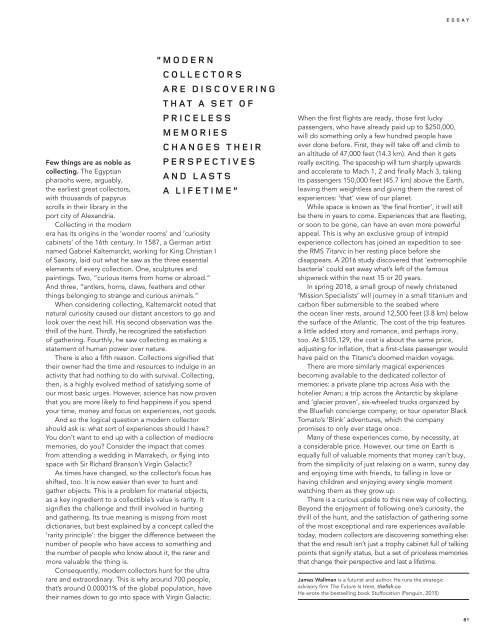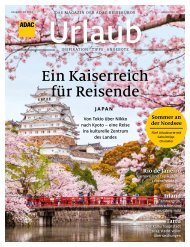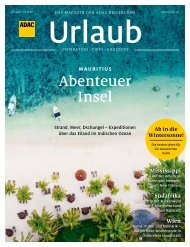ONELIFE #35 – American English
Land Rover steht für höchste Allradkompetenz, umfassenden Komfort und anspruchsvolle Technik. Diesem Geländewagen ist kein Weg zu weit und keine Aufgabe zu schwer – getreu dem Slogan „Above and Beyond“. ONELIFE vermittelt Land Rover-Kunden genau dieses Gefühl von Abenteuer und Freiheit.
Land Rover steht für höchste Allradkompetenz, umfassenden Komfort und anspruchsvolle Technik. Diesem Geländewagen ist kein Weg zu weit und keine Aufgabe zu schwer – getreu dem Slogan „Above and Beyond“. ONELIFE vermittelt Land Rover-Kunden genau dieses Gefühl von Abenteuer und Freiheit.
You also want an ePaper? Increase the reach of your titles
YUMPU automatically turns print PDFs into web optimized ePapers that Google loves.
ESSAY<br />
“MODERN<br />
COLLECTORS<br />
ARE DISCOVERING<br />
THAT A SET OF<br />
PRICELESS<br />
MEMORIES<br />
CHANGES THEIR<br />
PERSPECTIVES<br />
AND LASTS<br />
A LIFETIME”<br />
Few things are as noble as<br />
collecting. The Egyptian<br />
pharaohs were, arguably,<br />
the earliest great collectors,<br />
with thousands of papyrus<br />
scrolls in their library in the<br />
port city of Alexandria.<br />
Collecting in the modern<br />
era has its origins in the ‘wonder rooms’ and ‘curiosity<br />
cabinets’ of the 16th century. In 1587, a German artist<br />
named Gabriel Kaltemarckt, working for King Christian I<br />
of Saxony, laid out what he saw as the three essential<br />
elements of every collection. One, sculptures and<br />
paintings. Two, “curious items from home or abroad.”<br />
And three, “antlers, horns, claws, feathers and other<br />
things belonging to strange and curious animals.”<br />
When considering collecting, Kaltemarckt noted that<br />
natural curiosity caused our distant ancestors to go and<br />
look over the next hill. His second observation was the<br />
thrill of the hunt. Thirdly, he recognized the satisfaction<br />
of gathering. Fourthly, he saw collecting as making a<br />
statement of human power over nature.<br />
There is also a fifth reason. Collections signified that<br />
their owner had the time and resources to indulge in an<br />
activity that had nothing to do with survival. Collecting,<br />
then, is a highly evolved method of satisfying some of<br />
our most basic urges. However, science has now proven<br />
that you are more likely to find happiness if you spend<br />
your time, money and focus on experiences, not goods.<br />
And so the logical question a modern collector<br />
should ask is: what sort of experiences should I have?<br />
You don’t want to end up with a collection of mediocre<br />
memories, do you? Consider the impact that comes<br />
from attending a wedding in Marrakech, or flying into<br />
space with Sir Richard Branson’s Virgin Galactic?<br />
As times have changed, so the collector’s focus has<br />
shifted, too. It is now easier than ever to hunt and<br />
gather objects. This is a problem for material objects,<br />
as a key ingredient to a collectible’s value is rarity. It<br />
signifies the challenge and thrill involved in hunting<br />
and gathering. Its true meaning is missing from most<br />
dictionaries, but best explained by a concept called the<br />
‘rarity principle’: the bigger the difference between the<br />
number of people who have access to something and<br />
the number of people who know about it, the rarer and<br />
more valuable the thing is.<br />
Consequently, modern collectors hunt for the ultra<br />
rare and extraordinary. This is why around 700 people,<br />
that’s around 0.00001% of the global population, have<br />
their names down to go into space with Virgin Galactic.<br />
When the first flights are ready, those first lucky<br />
passengers, who have already paid up to $250,000,<br />
will do something only a few hundred people have<br />
ever done before. First, they will take off and climb to<br />
an altitude of 47,000 feet (14.3 km). And then it gets<br />
really exciting. The spaceship will turn sharply upwards<br />
and accelerate to Mach 1, 2 and finally Mach 3, taking<br />
its passengers 150,000 feet (45.7 km) above the Earth,<br />
leaving them weightless and giving them the rarest of<br />
experiences: ’that‘ view of our planet.<br />
While space is known as ‘the final frontier’, it will still<br />
be there in years to come. Experiences that are fleeting,<br />
or soon to be gone, can have an even more powerful<br />
appeal. This is why an exclusive group of intrepid<br />
experience collectors has joined an expedition to see<br />
the RMS Titanic in her resting place before she<br />
disappears. A 2016 study discovered that ‘extremophile<br />
bacteria’ could eat away what’s left of the famous<br />
shipwreck within the next 15 or 20 years.<br />
In spring 2018, a small group of newly christened<br />
‘Mission Specialists’ will journey in a small titanium and<br />
carbon fiber submersible to the seabed where<br />
the ocean liner rests, around 12,500 feet (3.8 km) below<br />
the surface of the Atlantic. The cost of the trip features<br />
a little added story and romance, and perhaps irony,<br />
too. At $105,129, the cost is about the same price,<br />
adjusting for inflation, that a first-class passenger would<br />
have paid on the Titanic’s doomed maiden voyage.<br />
There are more similarly magical experiences<br />
becoming available to the dedicated collector of<br />
memories: a private plane trip across Asia with the<br />
hotelier Aman; a trip across the Antarctic by skiplane<br />
and ‘glacier proven’, six-wheeled trucks organized by<br />
the Bluefish concierge company; or tour operator Black<br />
Tomato’s ‘Blink’ adventures, which the company<br />
promises to only ever stage once.<br />
Many of these experiences come, by necessity, at<br />
a considerable price. However, our time on Earth is<br />
equally full of valuable moments that money can’t buy,<br />
from the simplicity of just relaxing on a warm, sunny day<br />
and enjoying time with friends, to falling in love or<br />
having children and enjoying every single moment<br />
watching them as they grow up.<br />
There is a curious upside to this new way of collecting.<br />
Beyond the enjoyment of following one’s curiosity, the<br />
thrill of the hunt, and the satisfaction of gathering some<br />
of the most exceptional and rare experiences available<br />
today, modern collectors are discovering something else:<br />
that the end result isn’t just a trophy cabinet full of talking<br />
points that signify status, but a set of priceless memories<br />
that change their perspective and last a lifetime.<br />
James Wallman is a futurist and author. He runs the strategic<br />
advisory firm The Future Is Here, thefish.co<br />
He wrote the bestselling book Stuffocation (Penguin, 2015)<br />
81


















